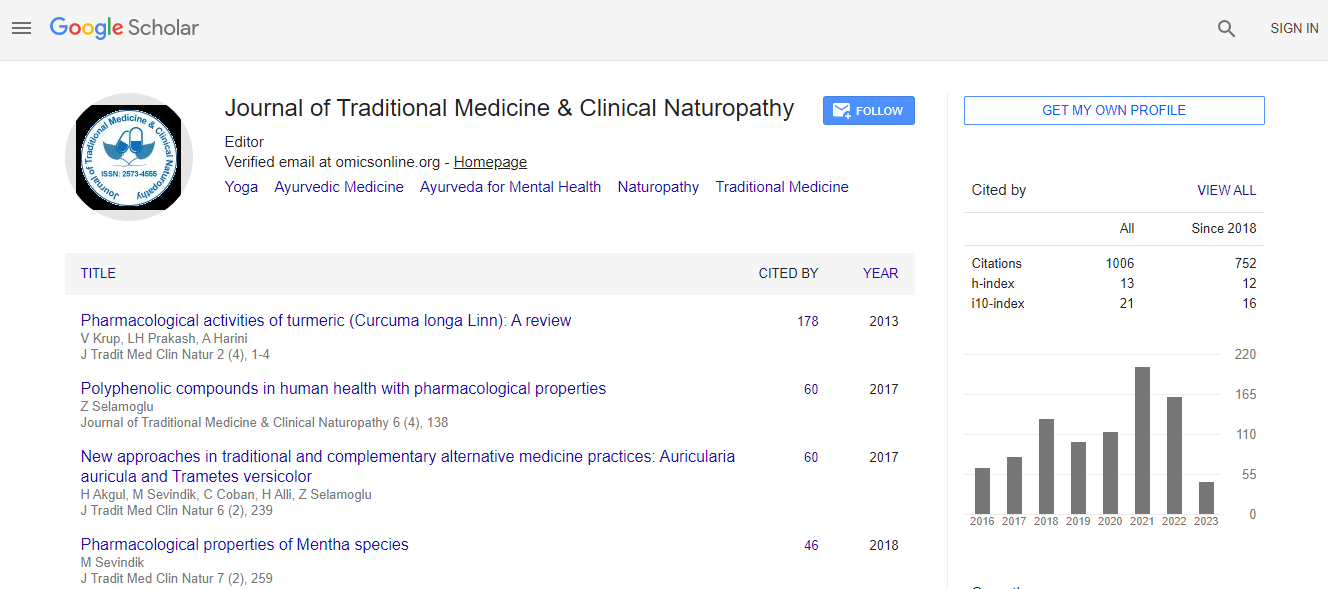Research Article
Ayurvedic Plants in Brain Disorders: The Herbal Hope
Balkrishna A and Misra LN*
Patanjali Research Foundation, Haridwar-249405, Uttarakhand, India
- *Corresponding Author:
- Misra LN
Patanjali Research Foundation
Near Patanjali Yog Peeth
NH 58, Haridwar-249405
Uttarakhand, India
Tel: 01334 244 805
E-mail: laxmisra@hotmail.com
Received Date: April 26, 2017; Accepted Date: May 11, 2017; Published Date: May 17, 2017
Citation: Balkrishna A, Misra LN (2017) Ayurvedic Plants in Brain Disorders: The Herbal Hope. J Tradit Med Clin Natur 6:221.
Copyright: © 2017 Balkrishna A, et al. This is an open-access article distributed under the terms of the Creative Commons Attribution License, which permits unrestricted use, distribution, and reproduction in any medium, provided the original author and source are credited.
Abstract
Synthetic drugs for human brain disorders are expensive symptomatic long treatments, sometimes showing serious and unavoidable side effects with poor patient compliance. Therefore, the herbal and Ayurvedic treatments are preferred over synthetic drugs for a range of human brain disorders including, Alzheimer’s disease, Parkinson’s disease, depression, epilepsy, schizophrenia, anxiety, etc. Ayurvedic system of medicine has traditionally been used in several neurological conditions. The accessibility, negligible incidence of side effects and cost effectiveness of plant products offer considerable advantages. These days much attention is drawn towards the established traditional systems of herbal remedies for many brain disorders, generating positive hopes for the patients. It is estimated that more than 60 million Indian populations suffers from mental disorders while the country lags far behind the world for treatments and spending in the hospitals for mental cure. Nearly 1-2% Indians suffered from schizophrenia and bipolar disorder whereas 5% population showed common mental disorders like depression, anxiety, convulsion, etc. The term mental disease is not restricted to mean insanity and allied conditions of mental derangement but also includes, to a certain extent, the emotional disorders. When emotional factors cross the state of normalcy, one gets deranged to show the syndromes of mental disorder, very often. With the current alarming situation, it is high time to look back to the ancient Indian Ayurvedic system of medicine wherein a number of plants have been described for specific uses for a range of mental disorders, including migraine, epilepsy, convulsion, hysteria, paralysis, memory loss (Alzheimer’s), insomnia, anxiety, Parkinson’s disease, insanity, depression, etc. The Ayurvedic prescriptions which contain either a single identity of plant or a mixture of plant materials have been proven to be very useful against such disorders. The plant materials prescribed for these problems range from herbs to perennial trees with varied plant parts, ranging from whole plant, roots, stem, bark, leaves, flowers, fruits to seeds. The chemical structure of the major compounds from these plants range from straight chain fatty acids to terpenoids, steroids, flavonoids, alkaloids, peptides, etc. It has been attempted to review the current situation of mental disorder in the society vis-a-vis its effective solution described in the Ayurveda and problem of side effects in synthetic medicines.
Graphical Abstract
 Spanish
Spanish  Chinese
Chinese  Russian
Russian  German
German  French
French  Japanese
Japanese  Portuguese
Portuguese  Hindi
Hindi 
